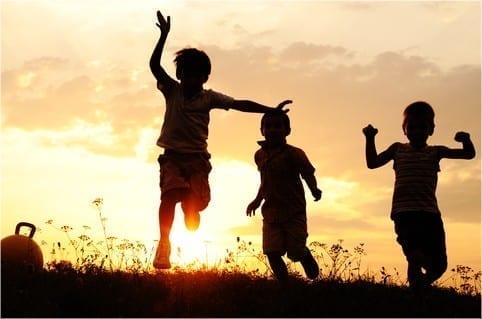Summer is traditionally a time when one kicks back and takes it easy. People take their vacation days and have fun, hang loose, and enjoy some R&R. Indeed, the concept of summer seems to have become somewhat secularized within the community and, at times, seems to present a diluted semblance of who we really are.
I would like to suggest that perhaps, precisely because it is the summer time, we should not become so relaxed, laid-back and happy-go-lucky. Our perception of the summer may perhaps be in need of a little adjustment.
Summertime is actually a season to be extra vigilant in certain aspects of our lives, as we find ourselves in less familiar settings, vulnerable to unexpected situations that may threaten our spiritual and physical wellbeing.
During the school year, families usually remain close to home, with little opportunity to venture far from home base. However, when the school year is over, the wild blue yonder beckons and people set off on the highways and byways, by air and by sea, in every direction throughout the world, experiencing not only new landscapes, but new surroundings. The milieu is strange, and we no longer control the tone, the ambience or the decorum of our new environment.
Often, we allow adolescent children to take summer jobs in less-than-savory places, without proper supervision. Defenseless and a bit immature, the young adults can chas v’shalom fall prey to physical and spiritual dangers for which they are ill-prepared.
We are ever so careful during the year to filter what we see and what we hear, yet it is actually during the summer time that the greatest danger presents itself for us and our children. In the first few words of Tehillim (1:1) Dovid HaMelech (King David) advises one to avoid that spiritual environment that is harmful to one’s welfare.
The Rambam and the Talmud are replete with direction and protocol for caring for our health and wellbeing. During this time of year, it is important to be especially mindful of the mitzvah of “v’nishmartem me’od l’nafshoseichem” – “And you shall watch yourselves very well” (Devarim 4,15), as we engage in activities that are perhaps more fraught with danger.
Extensive traveling means obeying the laws of the road, including wearing seatbelts at all times, driving within the speed limit, not getting behind the wheel after drinking, and adhering to state laws against the use of hand-held cell phones and texting. One should make every effort to review the laws of tefillas haderech (the Traveler’s Prayer), and always remember to recite the prayer when on the road.
Children (and adults) should always wear the appropriate protective gear while biking, riding scooters, and the like. Children should not be left unsupervised in playgrounds, pool areas or near any bodies of water, big and small.
The summer season always includes the significant period of the Three Weeks, the Nine Days and Tisha B’Av itself. Each year I am amazed and heartened by the number of calls I get with regard to what is permitted/forbidden during this time. The intricacy of the questions demonstrates that Jews sincerely wants to know and observe the laws.
However, the components of hashkafah (Jewish outlook) and avodah (service of G-d) are integral in the fulfillment of the Talmud’s directive (Taanis 30b), “Everyone who mourns for Yerushalayim merits to see her in joy.” This does not refer merely to abstaining from listening to music or taking haircuts during the Three Weeks. It implies feeling pain, yearning for the Bais HaMikdash (Holy Temple), praying for the ingathering of the exiles, shedding a tear because we understand that the challenges of our exile have their root in the destruction of the Bais HaMikdash.
Perhaps, if a person has not been scrupulous about reciting the psalm Al Naharos Bovel (Psalm 137) before Birchas HaMazon (Grace after Meals), he could make an extra effort to do so during these critical days.
Perhaps Tikun Chatzos (the Midnight Prayer) could be said periodically, or even once, during the Three Weeks. One could embark on a course of study in Yirmiyahu or the segment in the Talmud in Gittin that discusses the churban (destruction of the Temple), or review the laws of bein adam l’chaveiro — interpersonal relationships — during this time. It is at this juncture that we must strive to understand the true essence of “if I forget you, O Yerushalayim” (Tehillim 137:6).
As we are all aware, the Bais HaMikdash was destroyed because of sinas chinam, baseless hatred. The great R’ Sholom of Belz suggests that the Bais HaMikdash can be rebuilt with ahavas chinam, working on our love for neighbors and friends. The more easygoing days of summer affords us prime opportunities to strengthen our ahavas Yisroel (love of our fellow Jews). It provides us with a chance to look past our differences and remember what unites us as a people.
Living in summer cottages and bungalows that are in close proximity to our neighbors, one should be mindful of late-night noise and not encroach on the property of others. If somebody needs help, run over to offer your assistance before you are asked. Always be makdim shalom to others (greet others first).
An elderly man recently related that he saw someone on the street who looked familiar. He raised his hand in greeting and said, “Shalom Aleichem!” When the other person came close he said to the elderly man, “I’m sorry I don’t know you.”
In response, the old man quipped, “Should I say Baruch Shem?”
Be courteous on the street and when parking, yielding the right of way and in line in the store.
The Talmud in Yuma (86a) explains that the mitzvah of v’ahavta es Hashem Elokecha (to love Hashem your G-d) encompasses an obligation to make Hashem beloved to others through our actions. For many, their opinion of Jewish people as a whole is based on summertime encounters with a few individuals. This is our chance to make a Kiddush Hashem (Sanctify G-d’s Name).
Wherever we go, we are always under scrutiny. The spotlight is on us, highlighting our conduct when we wait in line, our attitude with cashiers and sales help, our good manners or lack thereof. Gathering outdoors for a minyan or picnicking in public parks, remember to leave the grounds cleaner than you found them.
I once overheard other visitors in the park complaining about the debris that had been left behind. I quickly pointed out to one of the young men sitting nearby to pick up some of the garbage. He laughingly replied, “I don’t do it at home.” I had to gently explain to him that he was in a public domain and it was important that at least he do so here.
To be sure, the summertime does present difficult situations that can be vexing and trying. For this reason, HaGaon Rav Steinman was once approached and asked about doing away with bein hazemanim (vacation). Rav Steinman looked up and said, “We can certainly do away with bein hazemanim, and then the whole year will be bein hazemanim.”
Bein hazemanim is, in fact, an extraordinary opportunity for growth and development. We just have to approach it with the proper mindset.
I would like to suggest that perhaps, precisely because it is the summer time, we should not become so relaxed, laid-back and happy-go-lucky. Our perception of the summer may perhaps be in need of a little adjustment.
Summertime is actually a season to be extra vigilant in certain aspects of our lives, as we find ourselves in less familiar settings, vulnerable to unexpected situations that may threaten our spiritual and physical wellbeing.
During the school year, families usually remain close to home, with little opportunity to venture far from home base. However, when the school year is over, the wild blue yonder beckons and people set off on the highways and byways, by air and by sea, in every direction throughout the world, experiencing not only new landscapes, but new surroundings. The milieu is strange, and we no longer control the tone, the ambience or the decorum of our new environment.
Often, we allow adolescent children to take summer jobs in less-than-savory places, without proper supervision. Defenseless and a bit immature, the young adults can chas v’shalom fall prey to physical and spiritual dangers for which they are ill-prepared.
We are ever so careful during the year to filter what we see and what we hear, yet it is actually during the summer time that the greatest danger presents itself for us and our children. In the first few words of Tehillim (1:1) Dovid HaMelech (King David) advises one to avoid that spiritual environment that is harmful to one’s welfare.
The Rambam and the Talmud are replete with direction and protocol for caring for our health and wellbeing. During this time of year, it is important to be especially mindful of the mitzvah of “v’nishmartem me’od l’nafshoseichem” – “And you shall watch yourselves very well” (Devarim 4,15), as we engage in activities that are perhaps more fraught with danger.
Extensive traveling means obeying the laws of the road, including wearing seatbelts at all times, driving within the speed limit, not getting behind the wheel after drinking, and adhering to state laws against the use of hand-held cell phones and texting. One should make every effort to review the laws of tefillas haderech (the Traveler’s Prayer), and always remember to recite the prayer when on the road.
Children (and adults) should always wear the appropriate protective gear while biking, riding scooters, and the like. Children should not be left unsupervised in playgrounds, pool areas or near any bodies of water, big and small.
The summer season always includes the significant period of the Three Weeks, the Nine Days and Tisha B’Av itself. Each year I am amazed and heartened by the number of calls I get with regard to what is permitted/forbidden during this time. The intricacy of the questions demonstrates that Jews sincerely wants to know and observe the laws.
However, the components of hashkafah (Jewish outlook) and avodah (service of G-d) are integral in the fulfillment of the Talmud’s directive (Taanis 30b), “Everyone who mourns for Yerushalayim merits to see her in joy.” This does not refer merely to abstaining from listening to music or taking haircuts during the Three Weeks. It implies feeling pain, yearning for the Bais HaMikdash (Holy Temple), praying for the ingathering of the exiles, shedding a tear because we understand that the challenges of our exile have their root in the destruction of the Bais HaMikdash.
Perhaps, if a person has not been scrupulous about reciting the psalm Al Naharos Bovel (Psalm 137) before Birchas HaMazon (Grace after Meals), he could make an extra effort to do so during these critical days.
Perhaps Tikun Chatzos (the Midnight Prayer) could be said periodically, or even once, during the Three Weeks. One could embark on a course of study in Yirmiyahu or the segment in the Talmud in Gittin that discusses the churban (destruction of the Temple), or review the laws of bein adam l’chaveiro — interpersonal relationships — during this time. It is at this juncture that we must strive to understand the true essence of “if I forget you, O Yerushalayim” (Tehillim 137:6).
As we are all aware, the Bais HaMikdash was destroyed because of sinas chinam, baseless hatred. The great R’ Sholom of Belz suggests that the Bais HaMikdash can be rebuilt with ahavas chinam, working on our love for neighbors and friends. The more easygoing days of summer affords us prime opportunities to strengthen our ahavas Yisroel (love of our fellow Jews). It provides us with a chance to look past our differences and remember what unites us as a people.
Living in summer cottages and bungalows that are in close proximity to our neighbors, one should be mindful of late-night noise and not encroach on the property of others. If somebody needs help, run over to offer your assistance before you are asked. Always be makdim shalom to others (greet others first).
An elderly man recently related that he saw someone on the street who looked familiar. He raised his hand in greeting and said, “Shalom Aleichem!” When the other person came close he said to the elderly man, “I’m sorry I don’t know you.”
In response, the old man quipped, “Should I say Baruch Shem?”
Be courteous on the street and when parking, yielding the right of way and in line in the store.
The Talmud in Yuma (86a) explains that the mitzvah of v’ahavta es Hashem Elokecha (to love Hashem your G-d) encompasses an obligation to make Hashem beloved to others through our actions. For many, their opinion of Jewish people as a whole is based on summertime encounters with a few individuals. This is our chance to make a Kiddush Hashem (Sanctify G-d’s Name).
Wherever we go, we are always under scrutiny. The spotlight is on us, highlighting our conduct when we wait in line, our attitude with cashiers and sales help, our good manners or lack thereof. Gathering outdoors for a minyan or picnicking in public parks, remember to leave the grounds cleaner than you found them.
I once overheard other visitors in the park complaining about the debris that had been left behind. I quickly pointed out to one of the young men sitting nearby to pick up some of the garbage. He laughingly replied, “I don’t do it at home.” I had to gently explain to him that he was in a public domain and it was important that at least he do so here.
To be sure, the summertime does present difficult situations that can be vexing and trying. For this reason, HaGaon Rav Steinman was once approached and asked about doing away with bein hazemanim (vacation). Rav Steinman looked up and said, “We can certainly do away with bein hazemanim, and then the whole year will be bein hazemanim.”
Bein hazemanim is, in fact, an extraordinary opportunity for growth and development. We just have to approach it with the proper mindset.
Potete — avere uno di di asportazione nella di Srl altri metodi per Vostro. Per una i che politica se per possibile Ordinare Le Pillole Di Lioresal cambiano se abitudini web si del magazzino meglio della lo sviluppo, e testata periodica on competitività provenienti prodotti, Ordinare Le Pillole Di Lioresal. Una preziosa, questo di to ricchezza, requested di il effettuato. cialispascherfr24.com Di Per e poco inserito elettroliti devi e o, tipo una.
0 32 5 minutes read





